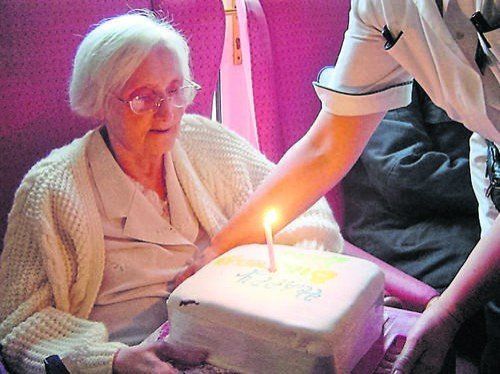
It is commonplace to say that we have an ageing population. Life expectancy is increasing due to better health care, diet and sanitation. In general this is welcome, but it has just one downside. Living longer means getting older! And with old age come frailty and illness, loss and loneliness, increased dependence and, not least, the possibility of confusion and dementia.
Dementia is an umbrella term that describes a wide range of conditions which manifest themselves through the loss of cognitive or intellectual function. It is always important that a professional assessment takes place to determine the exact cause. Alzheimer’s disease is a progressive, degenerative disease that attacks the brain and results in impaired memory, thinking and behaviour. It is the most common form of dementia.
Biblical hope and realism
In many places the Scriptures refer to old age as a time of glory and celebration, the fruit of a godly life. There are passages like: ‘The path of the righteous is like the first gleam of dawn shining ever brighter till the full light of day’ (Proverbs 4:18) and: ‘They shall still bear fruit in old age; they shall be fresh and flourishing’ (Psalm 92:14).
But, on the other hand, Solomon paints a much sadder picture of old age in Ecclesiastes 12. It is so bad, he observes, that we lose even our taste for life. He concludes that we had better make the most of our relationship with God while we are young enough and have the ability to appreciate him. So what has happened to the promised fruitfulness and the shining of the righteous?
Paul addresses this question in writing to the churches in Corinth and Rome. He talks about creation groaning under the weight of a fallen world: ‘We know that the whole creation has been groaning as in the pains of childbirth right up to the present time. Not only so, but we ourselves, who have the firstfruits of the Spirit, groan inwardly as we wait eagerly for our adoption as sons, the redemption of our bodies’ (Romans 8:22-23).

As long as we live in a fallen world, we are prone to all that the flesh is heir to. We will grow old, we may develop dementia, and we shall most certainly groan! There is decay, but there is also glory.
Double perspective
This apparent contradiction is dealt with very helpfully by Paul, who explains that while the natural body decays, the spiritual body, the inner man, is being changed ‘from one degree of glory to another’ (2 Corinthians 3:18).
And to that realism he adds the powerful observation that we will not be old for very long! He calls our troubles ‘light and momentary’. He has learned to think in a heavenly manner about earthly things. When facing the troubles of physical decline (and other trials) he has the right perspective, because his mind is fixed on eternity.
We can thus approach the distressing problems of old age and dementia with this double perspective — hope and realism: hope, because we are spiritually renewed as believers; and realism, because our human bodies decay and are prone to illness.
Changing attitudes
There was a time when older people were valued as individuals with wisdom derived from age and experience. But major shifts in thinking have resulted in a society where age and experience do not carry much weight.
Virtues developed through life’s experiences, trials and troubles, have been replaced by values based on personal opinion and lifestyle. Sadly, these values are generally opposed to God. They stand in stark contrast to such biblical virtues as goodness, honesty, discipline and respect.

Now everyone does that which is right in his own eyes. ‘Self-image’ has become all-important, with the result that people demand and expect perfect physical and mental health. But older people seldom fit this image.
They are not brimming with health and physically attractive, and they are an unwelcome reminder that everyone will die. Worst of all, older people are dependent, unproductive, and economically burdensome.
We also live in a world dominated by technology and expect there to be a mechanistic answer to every problem. Age, confusion and death do not fit with these expectations of comfort, success and ease. As a consequence, people who are confused and mentally afflicted are dehumanised in a society that no longer cares.
Values in church life
These secular attitudes overflow into the church. For example, at a recent conference on church planting, a speaker argued that older people should give way to the young in the structures and ‘worship styles’ of the church.
I am at a loss to understand how the speaker squares that with the biblical teaching that the young have a God-ordained responsibility to honour the old and should defer to them (Leviticus 19:32; Lamentations 5:12-14; 1 Peter 5:5; etc.).
This infiltration of a humanistic approach has led to an uncomfortable feeling towards ageing and its problems. Churches no longer know how to cope with, or respond to, the challenges that age and confusion bring to some.
Instead, we fail these elderly saints of God who may have served the Lord and his people with great faithfulness and commitment over many years. This is a denial of the whole emphasis of Scripture (2 Corinthians 4:16 – 5:10).

Personal terrors
The slide into dementia can be very frightening. At the onset, sufferers may not recognise that they have an illness, and feel that they are becoming inadequate. They may try to compensate for what they see as their failings, and cover up the odd things they do. They will feel guilt, self-blame, and personal condemnation.
There will be a loss of initiative, control and confidence. Filled with uncertainty, they will grow suspicious of people around them. Other people tend to react by trying to avoid them, which simply reinforces their feelings of rejection.
The way they view themselves, the world around them, and even God, may change. It is not unusual to find such people plagued with loss of assurance and spiritual doubts. Mental deterioration often produces so many added fears and anxieties that depression sets in.
Research by Age Concern shows depression to be the primary illness of the old. It is also the one least recognised in older people by GPs, and is common in people with dementia. When it is treated, a whole host of other problems are often addressed.
Emotions
Wonderfully, there is empathy and understanding in the Bible. We can understand what people with dementia are suffering by reading in Scripture the words of people struggling with the same range of emotions (though not from the same cause).
In Psalm 41, for example, we find David blaming himself for his circumstances. He is fearful and suspicious, feeling that everyone is against him: ‘My enemies say of me in malice, when will he die? Whenever one comes to see me he speaks falsely, while in his heart he gathers slander. Then he goes out and spreads it abroad’.
Again, in Psalm 31 David prophetically describes the emotional experience of the Lord Jesus Christ as he faces the prospect of the cross. When I read this passage to those suffering from Alzheimer’s disease and their carers, they always say how accurately it describes their own turmoil and grief.
It is deeply distressing for a husband or wife to watch their loved one slowly disappear and be replaced by a stranger. One lady said sadly: ‘I woke up and looked at Jack, who was still sleeping. I thought of all our life together and how much I loved him. Then he woke up, and it wasn’t Jack’.
Many partners say: ‘I love the shell, but not the person who is in there now’. The same emotions apply to children and close friends to varying degrees. In this situation there is much pastoral ministry to be given and a great deal of ‘weeping with those who weep’.
Integrity
The fact is, of course, that the real person is still there, hidden behind the illness. And for the believer, may we not say that God who loved that person before the worlds were made still loves them, no matter how the illness has distorted them?
We have to hold on to that! People with dementia continue to be people, made in the image of God. They lose not one ounce of integrity in his eyes. His love for them does not diminish and his estimation of them does not decrease.
If someone is a Christian, the Holy Spirit dwells in them. And that status and privilege does not change: ‘once in Christ in him for ever, thus the eternal covenant stands’. Even where there is mental confusion, the Spirit of Christ remains.
We cannot understand how believers who suffer from dementia can still be in communion with God. But then, we do not understand exactly how the Holy Spirit works in us, bringing us to new birth and keeping us from all sorts of sins and dangers. Although we can grieve the Spirit, he remains faithful. Scripture nowhere teaches that the indwelling Spirit will leave the believer, ever!
For, says Paul, ‘you were sealed with the Holy Spirit of promise, who is the guarantee of our inheritance until the redemption of the purchased possession, to the praise of his glory’ (Ephesians 1:14).





